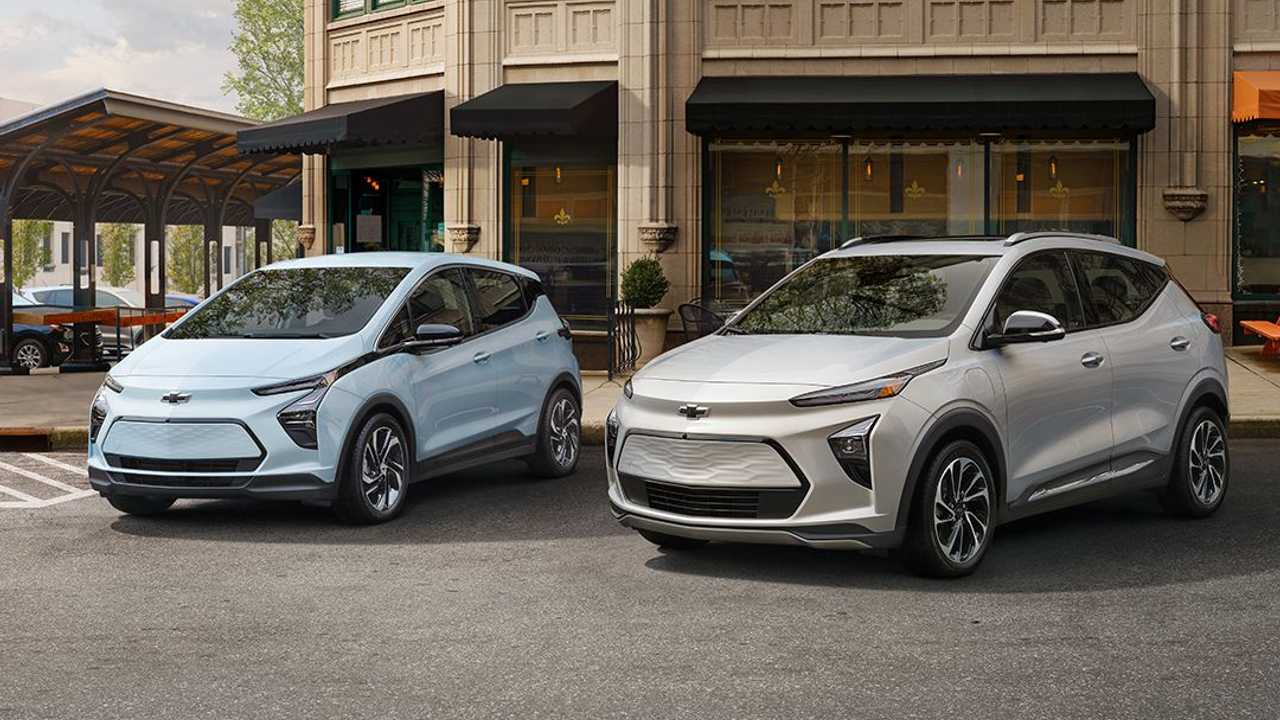Will the third time be the charm for Chevy’s diagnostic software? After multiple software updates, GM Authority is reporting yet another recall centered on specific Chevrolet Bolt EV and EUV model years.
While it is currently unknown how many cars will be impacted, the recall bulletin only involves specific 2020-2022 MY vehicles in which the diagnostic software was “incorrectly installed” previously. As GM Authority reports, dealers are instructed to reprogram the “Hybrid Powertrain Control Module 2, Battery Energy Control Module, and the Body Control module.” The correction is expected to require a roughly 1-hour service visit.
Get Fully Charged
Chevy Bolt Battery Fires Recall
For the uninitiated, the Bolt EV recall was to reduce the risk of fire due to “the simultaneous presence of two rare manufacturing defects in the same battery cell as the root cause of battery fires in certain Chevrolet Bolt EVs.” These fires would typically occur while the vehicle was charging. It was most common in vehicles that fully discharged and recharged the pack on a regular basis. All 2017–2019 model year Chevy Bolt EVs received a replacement, higher capacity battery pack as a result of the recall. Owners of 2020–2022 model year EVs and EUVs received a software update to continually monitor the high voltage battery pack for irregularities.
For some owners, this could possibly be the third time receiving a similar diagnostic software update.
The initial recall that rolled out in 2020 involved the installation of monitoring software intended to provide early detection of defective battery cells. But this was proven to be less-than-effective after two additional vehicles caught fire following the “fix”.
At first Bolt EVs and EUVs from the 2020 model year and later were not a part of the recall. All battery-related fires were attributed to packs assembled by LG Chem in South Korea between 2016 and 2019. Chevrolet claimed that any car built after LG moved cell production to the United States halfway through the 2019 model year was not defective.
But that all changed after a 2020 Bolt caught fire while charging in California. GM expanded the recall in August of 2021 to include all 140,000 units delivered. Owners of 2020+ model years were then given the same battery monitoring software and encouraged to park their vehicle outside and avoid deep discharges.
A stop sale was issued on all vehicles until a final remedy was developed later that year and sales resumed in early 2022. This final remedy was a second round of diagnostic software that temporarily limited the car to 80% charge and would monitor the pack for abnormalities. After several thousand miles of safe driving, the car would return to normal charge settings. So far this software has been successful and no recent fires have been reported.
Of the roughly 240,000 Bolt EVs and EUVs on the road, less than 2 dozen fires were reported and attributed to faulty cells. Most of these came from the 2019 model year with a handful occurring in 2017, 2018 and 2020 examples.
Every owner impacted by this latest recall should receive notice from GM in the coming weeks. They can also visit my.gm.com/recalls to see if their vehicle is included.
General Motors announced on Tuesday that they will be re-recalling some Chevrolet Bolt EV and Bolt EUV models in order to address a potential fire risk related to the vehicles’ battery packs. This marks the second recall for these models, as the first recall was issued in November 2020 for the same issue.
The software update being implemented aims to prevent a rare but potentially dangerous issue that could cause the battery packs in these vehicles to catch fire. It is estimated that around 95,000 vehicles worldwide are affected by this latest recall, with approximately 73,000 of them being within the United States.
The decision to re-recall these Chevy Bolt models comes after a series of reported battery fires in both parked and driving vehicles. While the exact cause of these fires has not been definitively determined, General Motors is taking proactive steps to ensure the safety of their customers and prevent any further incidents.
Owners of affected vehicles will be notified by General Motors and instructed to bring their cars to a dealership for the necessary software update. This update will limit the battery pack’s state of charge to 90%, reducing the risk of overcharging and overheating that could lead to a potential fire.
In the meantime, General Motors has advised owners of these vehicles to park them outside and away from structures until the software update can be completed. They have also recommended that owners avoid charging the vehicles to full capacity until the update has been completed.
While this latest recall may be an inconvenience for some Chevy Bolt EV and EUV owners, it is crucial for ensuring the safety and well-being of both the drivers and passengers of these vehicles. General Motors is committed to addressing this issue promptly and effectively, and we urge all affected owners to heed the company’s instructions and have their vehicles serviced as soon as possible.
In the broader context of the automotive industry’s shift towards electric vehicles, issues like these serve as a reminder of the importance of rigorous testing and quality control in the production of electric cars. As EV technology continues to evolve and become more widespread, manufacturers must remain vigilant in ensuring the safety and reliability of their products.
In conclusion, the decision to re-recall some Chevy Bolt EV and EUV models for a software update is a necessary precaution to address a potential fire risk associated with these vehicles’ battery packs. General Motors is taking proactive steps to protect their customers and prevent any further incidents, and we urge all affected owners to prioritize their safety and have their vehicles serviced as soon as possible.

